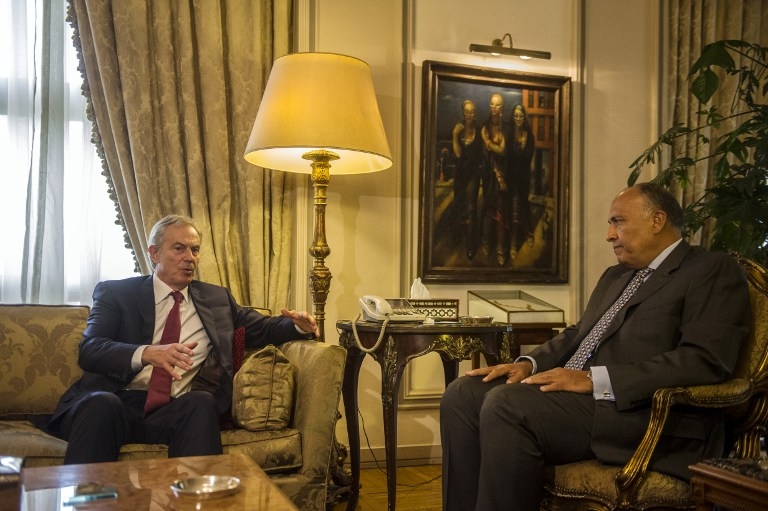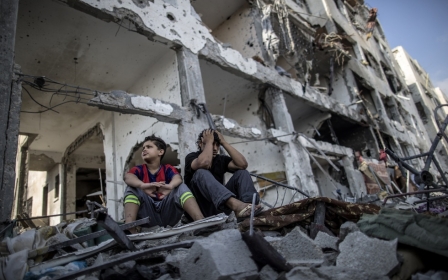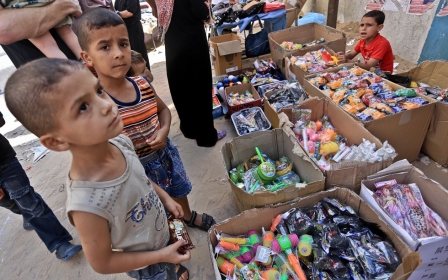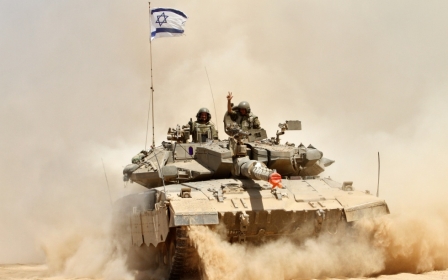Egypt ceasefire deal unlikely to be favourable to Gaza

As the 72-hour ceasefire between Israel and Palestinian resistance factions upholds for a second day on Wednesday, Egyptian officials mediate talks for a sustainable truce between the two sides.
Palestinian officials in Cairo said they would respond to the Israeli terms through the Egyptian officials, who are relaying terms laid down by the Israeli team which arrived in Cairo late Tuesday.
Meanwhile, international Middle East peace envoy Tony Blair and UN Middle East peace process coordinator Robert Serry held separate talks with Egyptian officials on Wednesday.
The Egyptian-mediated ceasefire that went into effect on Tuesday 05.00 GMT has brought relief to both sides after fighting which erupted on 8 July killed 1,875 Palestinians and 67 people on the Israeli side during a month-long struggle between Hamas and Israeli forces.
Israel has since completely withdrawn its forces from the besieged Palestinian enclave and the talks in Cairo aim to secure a durable ceasefire after the three-day window closes.
But some analysts are sceptical regarding the sustainability of a Hamas-Israel truce, as post-coup Egypt is not likely to push for terms that match those of the November 2012 ceasefire deal brokered by ousted president Mohamed Morsi.
A positive step
Experts say the talks are a constructive development which indicate an unlikely return to the violence witnessed in the Gaza Strip over the past few weeks.
“The talks are a positive step and although we can’t completely rule out more strikes and rockets, we are unlikely to see an escalation on the scale seen recently from the Israeli side. Israel has achieved a lot of its key strategic objectives - destroying Hamas’s tunnels and infrastructure,” said Sara Hassan, programme manager for the Oxford Research Group’s Middle East programme.
“While we do not know exactly when a permanent ceasefire will be established, it will eventually be reached,” said Yossi Mekelberg, associate fellow at the Middle East programme at Chatham House.
“There have been tactical achievements on both sides but neither can claim victory and now Israel and Palestine want peace,” he added.
Analysts believe that both Israel and Palestine are inclined towards reaching a peace agreement with some observers confident that Palestinians have leverage and will manage to successfully fulfill their conditions.
“Palestinians are at a good starting point in these negotiations,” said Hosam Zomlot, a visiting fellow at Harvard’s centre for Middle East Studies, who also served as a PLO representative to the UK between 2003 and 2008.
“The Palestinians are in a strong position because all their demands are legitimate, legal, fair and possible. The Palestinian factions are also united, while at the same time the level of Israel’s carnage on Gaza has moved the international community to support the Palestinians,” said Zomlot.
The Palestinian delegation wants an end to the Gaza blockade, an airport and seaport be allowed to operate in Gaza, a connection between the West Bank and Gaza as well as an expansion of its fishing rights to 12 nautical miles.
“Although we don’t expect an airport or seaport to operate in the next week, we expect that all the Palestinian demands will eventually be on track through these talks,” he added.
“Even lifting of the Gaza blockade and connecting Gaza and the West Bank – all these things are absolutely possible. It will just take pressure from the Palestinians and the international community to achieve them,” Zomlot told MEE.
Irreconcilable demands
Other analysts are less optimistic about the talks as they believe a wide gap exists between the two sides. They say fundamental issues in Gaza, which has been under siege by Israel since 2008, would have to be addressed to ensure a sustainable peace settlement to the month-long crisis.
“Underlying issues have not changed at all in terms of long-term prospects for negotiating peace. Realistically, it is unlikely we will see a meaningful agreement,” said Elizabeth Ferris, co-director of the Brookings-LSE Project on internal displacement and senior fellow in foreign policy at the Brookings Research Institute.
In addition to Palestinians’ demand an end to the eight-year Israeli blockade of Gaza, they also want the release of Palestinian prisoners. At the same time, Israel demands the demilitarisation of Hamas, while reports on the ground convey a senior Hamas official has already rejected the Israeli demand that militants in Gaza disarm.
“Hamas is going in with the demand to end the blockade while Israel is going in with the demand that Hamas must demilitarise – both sets of demands are difficult to reconcile and neither can be met half way,” said Hassan.
Senior Hamas official and delegation member Ezzat al-Rishq said Hamas would not even consider laying down their weapons, which include an arsenal of unguided rockets and anti-tank missiles.
"Whoever tries to take our weapons, we will take his life," he said on Twitter.
While Egypt brokered the 2012 ceasefire under the auspices President Mohamed Morsi, to ensure an Israeli demand that Hamas would not fire rockets onto Israel, President Abdelfatah Sisi - who is belligerent towards the Muslim Brotherhood and its Palestinian Hamas-branch - is not likely to assume a similar role today.
“Obama has been very keen that the parties return to the 2012 ceasefire agreement where Egypt acted as a guarantor that Hamas would not fire rockets, but this has been absent this time which it makes things more difficult,” added Hassan.
US Secretary of State John Kerry, in a BBC interview, called for a sustained ceasefire but stressed that the crucial wider issues would need to be tackled.
“The international community must make serious efforts to support conflict resolution and ensure initiatives contextualised within a genuine peace agreement between the two sides and not a temporary band aide for the situation,” Hassan told MEE.
Rafah border crossing
Another major contentious issue in the talks, is the opening the Rafah border crossing – a sore point in Egyptian-Palestinians relations for many years - located between Egypt's Sinai Peninsula and the Gaza Strip.
The talks however are focused on issues strictly involving Israel and the Palestinians, analysts have said.
“The Rafah crossing is an issue between Egypt and the Palestinians. These talks are about Israel; it is not likely that Rafah will be dealt with now,” said Zomlot.
The crossing, which is dedicated for the movement of persons, foodstuffs and medicine, was most of the time closed down by Egyptian authorities, especially in the last year when tensions soared between the Egyptian army-backed authorities and the Palestinian resistance movement Hamas.
Gazans have always complained that the crossing closure makes their suffering – induced by Israel's blockade of the Gaza Strip – even worse.
A member of the Palestinian delegation conducting the indirect talks with the Israelis in Cairo said on Wednesday that the re-opening of the Rafah crossing is not an issue that will be discussed as part of the talks.
"The management of the Rafah crossing is a purely Egyptian-Palestinian issue," Qais Abdel-Karim told Anadolu Agency. "The Israelis have nothing to do with it," he added.
Abdel-Karim said, however, that such an issue can be discussed between the Palestinians and Egyptians in due course.
"We have delivered a message to the head of Egypt's intelligence agency to this effect," Abdel-Karim said. "Egypt also prefers that this issue not to be discussed as part of the current talks."
Middle East Eye propose une couverture et une analyse indépendantes et incomparables du Moyen-Orient, de l’Afrique du Nord et d’autres régions du monde. Pour en savoir plus sur la reprise de ce contenu et les frais qui s’appliquent, veuillez remplir ce formulaire [en anglais]. Pour en savoir plus sur MEE, cliquez ici [en anglais].




